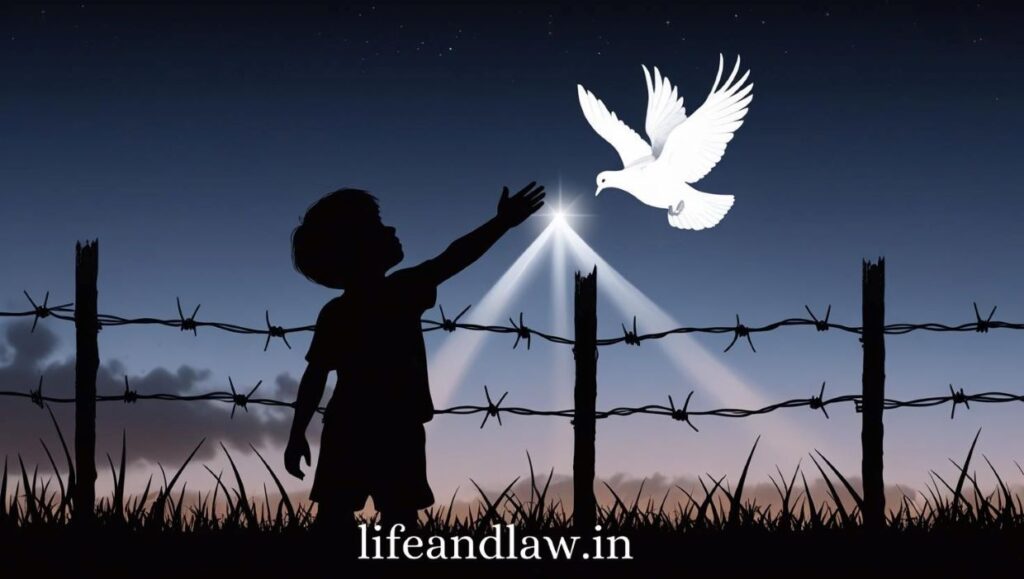Trending

Every year on June 4, the world commemorates the International Day of Innocent Children Victims of Aggression, a sad day dedicated to acknowledging the suffering of children caught in the crossfire of conflict and violence.
This day not only commemorates the resilience of these young victims, but also highlights the critical need for justice and protection. The condition of children in conflict zones is still one of the most distressing and difficult humanitarian crises today.
This article investigates the legal safeguards intended to protect these silent victims, the difficulties in executing these rules, and the continued search for justice.
Children are one of the most vulnerable groups during violent wars. Millions of children throughout the world face terrible challenges, such as being forced to become child soldiers, seeing the destruction of their homes, suffering physical and psychological trauma, losing access to school and healthcare, or being subjected to sexual violence and exploitation. According to UNICEF, armed groups recruit tens of thousands of youngsters each year, many of whom are subjected to violence and denied a childhood.
In crisis zones, innocent children endure perils that no child should ever experience. They are not just the victims of direct attacks, but also of the war’s collateral damage, such as starvation, displacement, and loss of family support. These traumatic events leave scars that might last a lifetime.
Recognizing the critical necessity to safeguard children caught up in armed situations, the international community has established numerous strong legal frameworks.
The United Nations Convention on the Rights of the Child (CRC), enacted in 1989, is the most important of them. It establishes comprehensive criteria for children’s rights and well-being. The Optional Protocol on the Involvement of minors in Armed Conflict (2000) clearly outlaws the recruitment and use of minors under the age of 18 in hostilities.
The Geneva Conventions and its further Protocols, which serve as the foundation of international humanitarian law (IHL), provide further important safeguards. These accords specifically prohibit the targeting of civilians and require special protection for children in armed conflicts.
The Rome Statute of the International Criminal Court (ICC) is also useful, categorizing the recruitment of child soldiers and attacks on children as war crimes and crimes against humanity, giving a tool for prosecuting perpetrators.
Furthermore, UN Security Council Resolutions, such as Resolution 1612, have established monitoring and reporting procedures for breaches against children in conflict, with the goal of holding perpetrators accountable and ensuring that protective measures are implemented.
These international laws emphasize several key principles:
1.Prohibition of Child Recruitment: Children under the age of 18 must not be recruited or utilized directly in hostilities, as conflict has a catastrophic influence on their development.
2.Protection from Sexual Violence: Sexual abuse and exploitation of minors during times of conflict are both grave violations of human rights and war crimes, according to international law.
3.Right to Education and Aid: Children should have unrestricted access to education and humanitarian aid, even in war zones, to ensure their future and dignity.
4.Accountability: Legal frameworks aim to ensure that perpetrators of crimes against children are brought to justice, preventing impunity.
Despite this solid legal foundation, protecting children in conflict zones presents major challenges.
Many conflicts take place in places where international actors have limited access, making monitoring and enforcement difficult. Non-state armed groups—often the principal perpetrators of child recruitment and abuse—frequently reject international conventions outright.
Furthermore, weak national court systems, a lack of political will, and continuous insecurity stymie investigations and prosecutions. In many situations, abusers operate with virtual impunity, exposing children to further abuse.
This disparity between law and reality highlights the challenges of protecting children in hazardous conflict zones.
There have been both hopeful and heartbreaking moments in the fight to preserve children’s rights in conflict.
For example, the International Criminal Court’s prosecution of Thomas Lubanga Dyilo was a historic moment since it was the first conviction for conscripting child soldiers, establishing a standard for responsibility.
Conflicts in places such as Syria and Yemen, on the other hand, expose the startling magnitude of crimes against children, with repeated allegations of recruitment, attacks on schools, and displacement emphasizing continued failures to protect these young lives.
Programs that help the rehabilitation and reintegration of former child soldiers, which are frequently backed by legislative frameworks and international financing, indicate the possibility of healing and rebuilding shattered lives.
International institutions, non-governmental organizations (NGOs), and civil society all play important roles in monitoring abuses, advocating for victims, and providing humanitarian assistance. Groups such as UNICEF and Human Rights Watch work relentlessly to document breaches, put pressure on governments and armed groups, and offer critical services to impacted children.
Global awareness initiatives around dates such as June 4 keep the issue in the public eye, promoting support for tighter legal safeguards and enforcement.
The International Day of Innocent Children Victims of Aggression highlights the urgent need to protect children affected by conflicts through strong legal systems. Legal experts like Adv. Abdul Mulla emphasize that following international laws requires responsible action and proper use of legal measures.
To truly protect these vulnerable children, international and national laws must be aggressively enforced and backed by continuous lobbying. Resources such as https://www.asmlegalservices.in/ and https://lifeandlaw.in/ emphasize the necessity of converting legal ideas into genuine protection, ensuring justice for people who frequently go unheard.
Adv. Abdul Mulla (Mob. No. 937 007 2022) is a seasoned legal professional with over 18 years of experience in advocacy, specializing in diverse areas of law, including Real Estate and Property Law, Matrimonial and Divorce Matters, Litigation and Dispute Resolution, and Will and Succession Planning. read more….
Copyright BlazeThemes. 2025